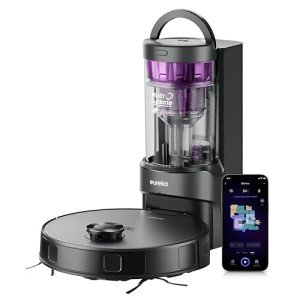10 Tell-Tale Symptoms You Need To Look For A New Automated Vacuum
The Rise of the Automated Vacuum: A Comprehensive Overview
As innovation continues to develop, so too does the way we approach daily jobs, consisting of cleaning our homes. robot vacuum sale of automated vacuums, commonly understood as robotic vacuums, has transformed the landscape of home tasks, offering a level of convenience formerly unimaginable. This post digs deep into the features, benefits, difficulties, and future of automated vacuums, illuminating why they are becoming a staple in contemporary homes.
What is an Automated Vacuum?
Automated vacuums are self-operating devices developed to tidy floorings while needing very little human intervention. Geared up with sensors, they browse spaces, prevent barriers, and go back to their charging stations when short on battery. Lots of models even use programmability via smart device apps, allowing users to set cleaning schedules or manage the vacuum remotely.
Secret Features of Automated Vacuums
Feature
Description
Navigation
Uses sensing units and cameras to draw up spaces, enabling systematic cleaning courses.
Programmable Cleaning
Users can schedule cleanings through mobile apps or pre-set timers on the device.
Smart Home Integration
Compatibility with smart home systems (e.g., Alexa, Google Home) for voice control.
Dirt Detection
Advanced designs can recognize areas with more dirt and concentrate on them for deeper cleaning.
Charge Dock
Automatically go back to its charging station when battery levels are low.
Several Surface Cleaning
Can shift perfectly between numerous floor types, including carpet, tile, and wood.
Advantages of Automated Vacuums
Time-Saving: Automated vacuums can considerably lower the time invested in home chores, enabling users to assign their time to more enjoyable activities.
Consistency: These devices offer a consistent cleaning schedule, guaranteeing that dirt and dust don't have a chance to build up.
Accessibility: Individuals with movement obstacles might discover automated vacuums particularly helpful, as they alleviate the physical demands of vacuuming.
Technological Innovation: Many models include advanced functions such as app control, which enables users to keep track of and control their vacuum from virtually anywhere.
Energy Efficient: Most robotic vacuums are developed to run efficiently, using less energy than traditional vacuum cleaners.
Downsides to Consider
While the advantages of automated vacuums are various, there are also some prospective downsides:
- Cost: While rates have actually ended up being more competitive, high-end designs can still be a significant investment.
- Limited Suction Power: Robotic vacuums may not use the same powerful suction as conventional designs, specifically on high-pile carpets.
- Upkeep Needs: Users should regularly clean up brushes and filters to keep optimal efficiency.
- Size Restrictions: Some students might have a hard time to browse tight spaces or high furnishings, resulting in areas that stay uncleaned.
Popular Brands and Models
When buying an automated vacuum, it's necessary to choose a reliable brand that fits specific cleaning requirements. Here are some widely-regarded choices in the market:
Brand
Model
Key Features
iRobot
Roomba i7+
Self-emptying base, advanced smart mapping, Alexa compatible.
Ecovacs
Deebot Ozmo T8
Integrated mopping function, exceptional navigation, and smart home compatibility.
Roborock
Roborock S7
Strong suction power, sonic mopping, multi-floor mapping.
Neato Robotics
Neato D7
D-shape style for corners, LaserSmart mapping innovation.
Future of Automated Vacuums
The trajectory for automated vacuums points towards greater elegance and integration with smart home innovations. As artificial intelligence (AI) ends up being more embedded in family devices, future models are anticipated to leverage machine discovering to improve their cleaning performance and navigational abilities.
Possible developments consist of:
- Enhanced AI Learning: Improved algorithms allowing vacuums to discover user habits and adapt their cleaning schedules appropriately.
- Better Navigation: Continued advancement of LiDAR and electronic camera systems for better barrier avoidance and mapping.
- Multifunctionality: The emergence of vacuums that can not only tidy floorings however also tackle cleaning and other household tasks.
Regularly Asked Questions (FAQs)
Q1: Can automated vacuums clean carpets effectively?
A1: Many modern-day automated vacuums feature strong suction abilities and specialty brushes developed for carpet cleaning. However, deep cleaning high-pile carpets might still need traditional vacuuming techniques.
Q2: How long do automated vacuums generally work on a single charge?
A2: The runtime can differ by design, however most robotic vacuums can operate between 60 to 120 minutes before needing a recharge. More innovative designs might have longer runtimes.
Q3: Are automated vacuums suitable for homes with animals?
A3: Yes, many automated vacuums are created with animal owners in mind. They often include more powerful suction and tangle-free brushes that can select up pet hair efficiently.
Q4: How frequently should I run my automated vacuum?
A4: This mostly depends upon the foot traffic in your home and individual choice, however lots of users find running it day-to-day or every other day keeps their floors clean.
Q5: Can I by hand control my automated vacuum?
A5: Yes, most automated vacuums include handbook control choices by means of remote or mobile apps, permitting users to direct the vacuum to particular areas.
Automated vacuums represent the crossway of innovation and convenience, substantially simplifying household cleaning jobs. While robot vacuum hoover may have constraints, their advantages often exceed the downsides, making them a valuable addition to contemporary homes. As innovation continues to advance, we can expect these gadgets to progress even more, improving their energy and performance. For anyone seeking a more efficient cleaning routine, an automated vacuum may simply be the service.
